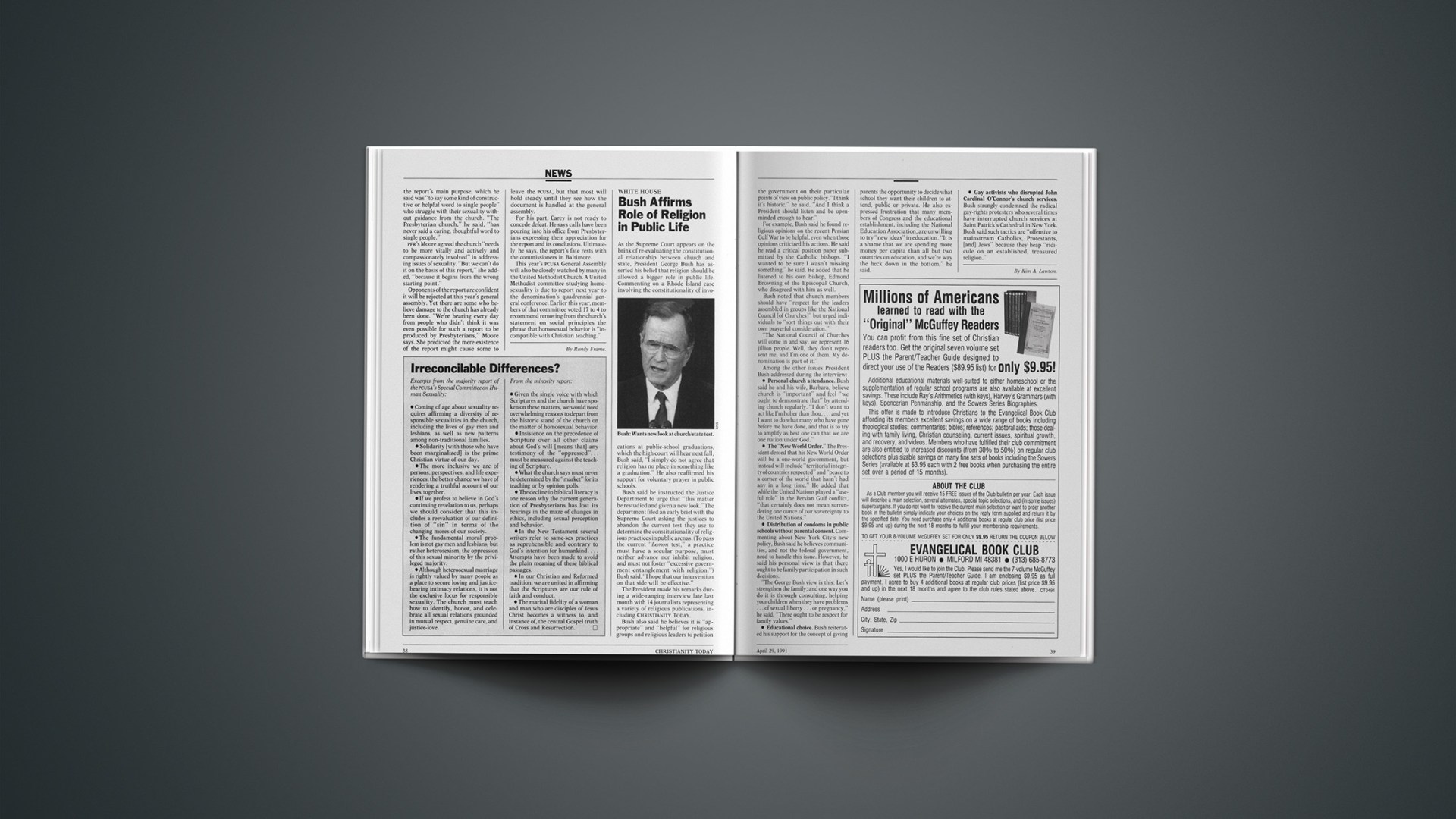As the Supreme Court appears on the brink of re-evaluating the constitutional relationship between church and state, President George Bush has asserted his belief that religion should be allowed a bigger role in public life. Commenting on a Rhode Island case involving the constitutionality of invocations at public-school graduations, which the high court will hear next fall, Bush said, “I simply do not agree that religion has no place in something like a graduation.” He also reaffirmed his support for voluntary prayer in public schools.
Bush said he instructed the Justice Department to urge that “this matter be restudied and given a new look.” The department filed an early brief with the Supreme Court asking the justices to abandon the current test they use to determine the constitutionality of religious practices in public arenas. (To pass the current “Lemon test,” a practice must have a secular purpose, must neither advance nor inhibit religion, and must not foster “excessive government entanglement with religion.”) Bush said, “I hope that our intervention on that side will be effective.”
The President made his remarks during a wide-ranging interview late last month with 14 journalists representing a variety of religious publications, including CHRISTIANITY TODAY.
Bush also said he believes it is “appropriate” and “helpful” for religious groups and religious leaders to petition the government on their particular points of view on public policy. “I think it’s historic,” he said. “And I think a President should listen and be open-minded enough to hear.”
For example, Bush said he found religious opinions on the recent Persian Gulf War to be helpful, even when those opinions criticized his actions. He said he read a critical position paper submitted by the Catholic bishops. “I wanted to be sure I wasn’t missing something,” he said. He added that he listened to his own bishop, Edmond Browning of the Episcopal Church, who disagreed with him as well.
Bush noted that church members should have “respect for the leaders assembled in groups like the National Council [of Churches]” but urged individuals to “sort things out with their own prayerful consideration.”
“The National Council of Churches will come in and say, we represent 16 jillion people. Well, they don’t represent me, and I’m one of them. My denomination is part of it.”
Among the other issues President Bush addressed during the interview:
• Personal church attendance. Bush said he and his wife, Barbara, believe church is “important” and feel “we ought to demonstrate that” by attending church regularly. “I don’t want to act like I’m holier than thou, … and yet I want to do what many who have gone before me have done, and that is to try to amplify as best one can that we are one nation under God.”
• The “New World Order.” The President denied that his New World Order will be a one-world government, but instead will include “territorial integrity of countries respected” and “peace to a corner of the world that hasn’t had any in a long time.” He added that while the United Nations played a “useful role” in the Persian Gulf conflict, “that certainly does not mean surrendering one ounce of our sovereignty to the United Nations.”
• Distribution of condoms in public schools without parental consent. Commenting about New York City’s new policy, Bush said he believes communities, and not the federal government, need to handle this issue. However, he said his personal view is that there ought to be family participation in such decisions.
“The George Bush view is this: Let’s strengthen the family; and one way you do it is through consulting, helping your children when they have problems … of sexual liberty … or pregnancy,” he said. “There ought to be respect for family values.”
• Educational choice. Bush reiterated his support for the concept of giving parents the opportunity to decide what school they want their children to attend, public or private. He also expressed frustration that many members of Congress and the educational establishment, including the National Education Association, are unwilling to try “new ideas” in education. “It is a shame that we are spending more money per capita than all but two countries on education, and we’re way the heck down in the bottom,” he said.
• Gay activists who disrupted John Cardinal O’Connor’s church services. Bush strongly condemned the radical gay-rights protesters who several times have interrupted church services at Saint Patrick’s Cathedral in New York. Bush said such tactics are “offensive to mainstream Catholics, Protestants, [and] Jews” because they heap “ridicule on an established, treasured religion.”










